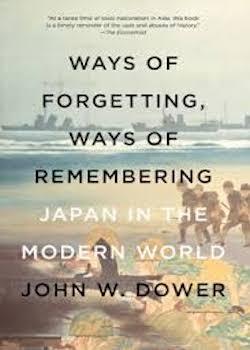Ways of Forgetting, Ways of Remembering: Japan in the Modern World

By John W. Dower
The New Press, New York
2012, 324 pages including notes and index
ISBN 978-1-59558-618-6
Review by Sir Hugh Cortazzi
John Dower, who is Professor Emeritus of History at MIT, has specialized in the modern history of Japan. His book Embracing Defeat was a penetrating analysis of Japan in the immediate post-war years. In this collection of essays Professor Dower concentrates on perceptions in Japan and the United States of the war and its aftermath.
The first essay focuses on the Canadian historian E.H. Norman who published the first scholarly study in English of the Meiji era. Norman, who had been appointed Canadian Ambassador to Egypt in 1956, committed suicide in 1957 following accusations in Senator McCarthy’s inquisition into allegations of communist activities. Norman, as Dower makes clear, did not advocate Marxist revolution. He quotes a speech which Norman delivered at Keio University in 1948 on the theme ‘Persuasion or Force: The Problem of Free Speech in Modern Society’ which demonstrates Norman’s commitment to free speech and persuasion rather than force.
In discussing Norman’s work Dower raises the question of ‘whether the present emphasis [among historians] on narrow but ‘deep’ vertical research’ makes for ‘a fuller comprehension of Japanese history.’
His essay on Race, Language and War in Two Cultures asks: ‘Given the virulence of the race hate that permeated the Pacific war, at first it seems astonishing that Americans and Japanese were able to move so quickly toward cordial relations after Japan’s surrender.’ Dower notes that ‘Racism did not disappear from the US-Japan relationship, but it was softened and transmogrified.’ ‘Paternalistic patronage on the American side’ was met with acquiescence on the part of the Japanese.
Japan’s Beautiful Modern War discusses Japanese war propaganda which he thinks was ‘brilliant, and without confronting it squarely we are doomed never to grasp the full nature of Japan’s war – and, by extension, never to have the broad comparative perspective necessary to see how all peoples and cultures make their wars beautiful, noble and just’ [in their own eyes at least!]
Dower’s essay entitled An aptitude for being unloved: War and Memory in Japan discusses the way in which many Japanese have come to see themselves as victims rather than aggressors. But he points out that white-washing and sanitization of history are not unique to Japan. The United States is still reluctant to accept responsibility for the carnage in Vietnam. He also reminds readers of the way in which the Americans for pragmatic reasons exonerated the Showa emperor from any responsibility “for policies and actions undertaken in his name.” But this was not the only American cover-up. “The most appalling of these cover-ups was the case of Unit 731 involving high-level [Japanese] officers and scientific researchers whose practice of official, institutionalized murder is comparable to the crimes of the ‘Nazi doctors'” He asks: “can it not be said that most nations, states, peoples, collectivities fall short when it comes to thinking in terms of equality and assuming a sense of responsibility for historical transgressions?”
Two essays deal with the results of American saturation bombing of Japanese cities and the atomic bombs dropped on Hiroshima and Nagasaki. The diary of a Hiroshima doctor which Dower quotes is moving with its “modesty and dignity” and “of course, pathos.” But even in the Hiroshima peace park “the Japanese reveal themselves to be both victims and victimizers” by “keeping a memorial to the Korean victims from violating the central, sacred ground.”
Dower’s essay Mocking Misery: Grassroots Satire in Defeated Japan shows that despite Japanese privations in the immediate post-war years many Japanese still retained a sense of humour.
Dower rightly rejected the idea put forward by some American strategists with little knowledge of history that the occupation of Japan could be a suitable model for post-invasion Iraq. Somewhat mischievously he suggests that perhaps the Japanese occupation of Manchuria might be a more appropriate example.
Dower’s new book contains much food for thought for anyone interested in modern Japan.

